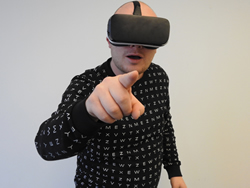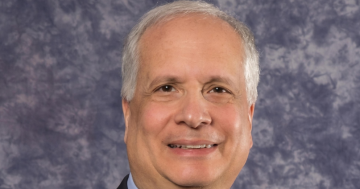Joan Michelsoni* says using virtual reality to show men what it’s like to be discriminated against at work was among the unusual topics at a recent conference on mobilising women.

Photo: Hammer & Tusk
What would happen if the guy who keeps cutting you off in meetings or dismissing your ideas could experience what it’s like to be on the receiving end of his rudeness?
With virtual reality (VR) technologies maybe he could.
That was one of the ideas that came to mind listening to the unusual advice for “Mobilising the Power of Women” at the Ellevate Summit 2018.
At the Summit, Malika Saada Saar, Google’s Senior Counsel on Civil and Human Rights and a long-time human rights attorney, talked about using Google’s VR platform “to help bear witness to others’ experience.”
It made me think about all the ways VR might be used to help bridge the gaps between men and women in the workplace.
Can VR give men the experience of what it’s like to be belittled, continuously interrupted, or passed over and other subtle digs that women endure every day that undermine women’s credibility and career progress?
Since many men do not realise how their behaviour undermines women, putting the virtual shoe on the other foot might make a difference.
The Ellevate conference, aimed at creating “a movement for action against gender inequality,” assembled an eclectic array of speakers — corporate leaders, artists, entrepreneurs, activists and members of the media — around their theme of “Mobilising the Power of Women”.
The conference was produced by the Ellevate Network, which is owned by former Merrill Lynch Wealth Management CEO Sallie Krawcheck.
These were not the typical voices and insights I’ve heard at dozens of women’s conferences, nor were they the usual pairings of voices on a panel.
Usually, panels of people in similar jobs or industries talk about networking, confidence, or day-to-day work or industry issues.
Ellevate seemed different.
Here are some highlights:
“Talk about the things people don’t want to talk about,” the outspoken artist-activist-writer Whitney Bell challenged the audience.
“Break it down to your humanity and have a real conversation,” she impassioned.
“You don’t need to have all the answers before you get the job,” Alina Cho, a long-time broadcast journalist and contributor to CBS Sunday Morning, explained.
As an HP study found, “Women working at HP applied for a promotion only when they believed they met 100 per cent of the qualifications listed for the job.”
“Men were happy to apply when they thought they could meet 60 per cent of the job requirements.”
“What got you where you are is not going to get you to the next level,” Mike Steib, CEO of XO Group, declared.
Most motivational speakers say that you know what to do, and Steib reminded them what they do not know, so he may have shaken up a few people.
“Check out how plum assignments are distributed,” Charlotte Burrows, Commissioner of the US Equal Employment Opportunity Commission (EEOC) advised.
This seemed to direct women to look beneath the surface of their work situation, rather than focus on the fact that they didn’t get the promotion.
“Benchmark against your industry” when identifying diversity goals, not against the population as so many diversity programs do, Allison Green, Senior Vice President of Diversity, Inclusion and Employment Engagement at Lincoln Financial, suggested.
“The private sector has more control over human rights than the Government or civil society,” Google’s Saar declared, having spent her entire career as a human rights attorney and advocate.
Protection of human rights is a fundamental responsibility of the Federal Government, so to see this as more in the hands of the private sector is unique.
The United Nations Declaration of Human Rights is focused on the responsibility of governments to protect the rights of their citizens as well.
The equally eclectic, multi-generational audience seemed right in line with the unconventional perspectives.
A few other Ellevate speakers with particularly moving stories of triumph over adversity were inspiring and illustrated ways to reframe huge challenges as well:
“Obstacles are just opportunities in disguise,” is a sentiment we’ve heard before, but this time it had more impact, because it came from Dr.Anjali Forber-Pratt, Paralympic Medallist and Assistant Professor at Vanderbilt, who has spent nearly her entire life in a wheelchair.
Offer to take notes for someone in a meeting (or class) with you who is hearing impaired, was a tip that technology expert and hearing health advocate K.R. Liu gave that struck me as one of those obvious-yet-novel ways to help.
Liu has had severe hearing loss since age three and focuses on leveraging 21st century technology to develop affordable, “socially acceptable” hearing support to improve the productivity and quality of life of the hearing impaired.
These are nuggets of unconventional wisdom we would all be wise to remember.
* Joan Michelson is a speaker, consultant and journalist who hosts Green Connections Radio podcasts.
This article first appeared at www.forbes.com.











